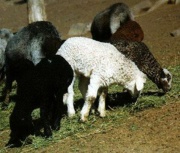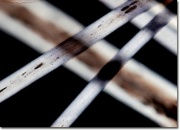Difference between revisions of "Karakul"
Jump to navigation
Jump to search
m (Text replace - "== Authority ==" to "== Sources Checked for Data in Record ==") |
|||
| Line 1: | Line 1: | ||
[[File:karakullambf5.jpg|thumb|Karakul lambs]] | [[File:karakullambf5.jpg|thumb|Karakul lambs]] | ||
== Description == | == Description == | ||
| − | + | [[File:babycaraculhair1large.jpg|thumb|Karakul]] | |
The fleece or skin from the karakul sheep (Ovis aries) originally bred in Asia near lake Kara Kul in Uzbekistan. Karakul sheep are now raised in Afghanistan and Namibia. The sheep have a dense curly fleece that is black in the lambs (called [[astrakhan]]) and changes to gray or brown for adults. The black fur pelts are highly valued and are used for coats and garment trim. The [[wool]] of the older sheep is used for carpets and blankets. | The fleece or skin from the karakul sheep (Ovis aries) originally bred in Asia near lake Kara Kul in Uzbekistan. Karakul sheep are now raised in Afghanistan and Namibia. The sheep have a dense curly fleece that is black in the lambs (called [[astrakhan]]) and changes to gray or brown for adults. The black fur pelts are highly valued and are used for coats and garment trim. The [[wool]] of the older sheep is used for carpets and blankets. | ||
| Line 8: | Line 8: | ||
broadtail; Persian lamb; Tibet lamb; Kalgan lamb; astrakhan; karakul'skaya (Rus.); karagul (Turk.); bukhara (Esp.); caracu (Esp.); astracán (Esp.); caracul (Ned); | broadtail; Persian lamb; Tibet lamb; Kalgan lamb; astrakhan; karakul'skaya (Rus.); karagul (Turk.); bukhara (Esp.); caracu (Esp.); astracán (Esp.); caracul (Ned); | ||
| − | + | ==Physical and Chemical Properties== | |
| − | == | ||
| − | |||
| − | |||
| − | Native region colors names: Arabi (black), Guligas (pink-roan), Kambar (brown), Shirazi (grey) and Sur (agouti). | + | * Imported to US in 1908 or after |
| + | * Native region colors names: Arabi (black), Guligas (pink-roan), Kambar (brown), Shirazi (grey) and Sur (agouti). | ||
| − | == | + | ==Resources and Citations== |
* ''Fairchild's Dictionary of Textiles'', Phyllis G.Tortora, Robert S. Merkel (eds.), Fairchild Publications, New York City, 7th edition, 1996 | * ''Fairchild's Dictionary of Textiles'', Phyllis G.Tortora, Robert S. Merkel (eds.), Fairchild Publications, New York City, 7th edition, 1996 | ||
| − | * ''Encyclopedia Britannica'', http://www.britannica.com Comment: "Karakul." | + | * ''Encyclopedia Britannica'', http://www.britannica.com Comment: "Karakul." Accessed 2 Sept. 2004, introduced to the US in 1909 |
* Edward Reich, Carlton J. Siegler, ''Consumer Goods: How to Know and Use Them'', American Book Company, New York City, 1937 | * Edward Reich, Carlton J. Siegler, ''Consumer Goods: How to Know and Use Them'', American Book Company, New York City, 1937 | ||
| − | * Website | + | * Website: www.iftf.com/facts_karakul.asp (Accessed Sept. 7, 2005) |
| − | * | + | * OSU Breeds of livestock at http://www.ansi.okstate.edu/breeds/sheep/karakul/ gives 'introduced.to the U.S. between 1908 and 1929 for pelt production" |
| − | * Wikipedia | + | * Wikipedia: http://en.wikipedia.org/wiki/Karakul (Accessed Nov. 9, 2005) |
* G.S.Brady, ''Materials Handbook'', McGraw-Hill Book Co., New York, 1971 Comment: p. 430 | * G.S.Brady, ''Materials Handbook'', McGraw-Hill Book Co., New York, 1971 Comment: p. 430 | ||
Latest revision as of 12:47, 15 September 2022
Description
The fleece or skin from the karakul sheep (Ovis aries) originally bred in Asia near lake Kara Kul in Uzbekistan. Karakul sheep are now raised in Afghanistan and Namibia. The sheep have a dense curly fleece that is black in the lambs (called Astrakhan) and changes to gray or brown for adults. The black fur pelts are highly valued and are used for coats and garment trim. The Wool of the older sheep is used for carpets and blankets.
Synonyms and Related Terms
broadtail; Persian lamb; Tibet lamb; Kalgan lamb; astrakhan; karakul'skaya (Rus.); karagul (Turk.); bukhara (Esp.); caracu (Esp.); astracán (Esp.); caracul (Ned);
Physical and Chemical Properties
- Imported to US in 1908 or after
- Native region colors names: Arabi (black), Guligas (pink-roan), Kambar (brown), Shirazi (grey) and Sur (agouti).
Resources and Citations
- Fairchild's Dictionary of Textiles, Phyllis G.Tortora, Robert S. Merkel (eds.), Fairchild Publications, New York City, 7th edition, 1996
- Encyclopedia Britannica, http://www.britannica.com Comment: "Karakul." Accessed 2 Sept. 2004, introduced to the US in 1909
- Edward Reich, Carlton J. Siegler, Consumer Goods: How to Know and Use Them, American Book Company, New York City, 1937
- Website: www.iftf.com/facts_karakul.asp (Accessed Sept. 7, 2005)
- OSU Breeds of livestock at http://www.ansi.okstate.edu/breeds/sheep/karakul/ gives 'introduced.to the U.S. between 1908 and 1929 for pelt production"
- Wikipedia: http://en.wikipedia.org/wiki/Karakul (Accessed Nov. 9, 2005)
- G.S.Brady, Materials Handbook, McGraw-Hill Book Co., New York, 1971 Comment: p. 430
- Random House, Webster's Encyclopedic Unabridged Dictionary of the English Language, Grammercy Book, New York, 1997
- The American Heritage Dictionary or Encarta, via Microsoft Bookshelf 98, Microsoft Corp., 1998

